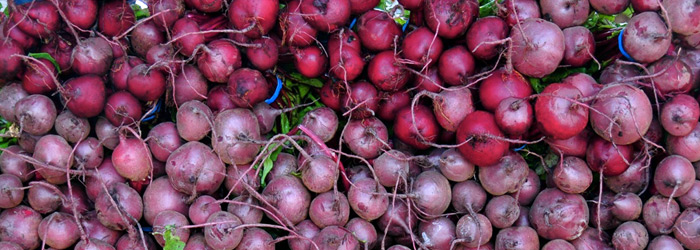Why Many Olympians Will Pee Pink or Purple

Juicing a beet provides a deeply colored liquid rich in chemicals called nitrates, and promises to provide multiple sources of assistance to athletes, both physiological and psychological.
Ed Yourdon via flickr
(ISNS) -- Call them pre-performance tweaks, athlete hacks, or just plain smart. In an effort to extrude every last bit of performance from their bodies, Olympians are likely to ingest some strange-sounding supplements in their final preparations for competition.
Beetroot juice, bicarbonate of soda, and caffeine may sound like the ingredients for a particularly colorful science-fair project, but sports physiology experts say these competition-legal supplements may significantly improve an athlete's performance.
"A one-percent difference in performance is something that will separate the guy who wins the 100 meter gold medal from the guy who comes last in the race," said Michael Gleeson, an exercise biochemist at Loughborough University in Leicestershire, U.K.
Caffeine is one supplement that many non-athletes rely on every day. Although athletes' use was once subject to limits under antidoping rules, it is no longer a regulated substance. The athletes are seeking many of the same benefits that the rest of us gain from a cup of coffee.
Beyond the benefits that most people recognize, such as increased alertness, "[Caffeine] also improves a lot of other physiological parameters, so a lot of people take it," said Keith Baar, an exercise physiologist at the University of California, Davis.
"There's no real reason why athletes wouldn't be taking caffeine," said Gleeson. "The dose that's needed to improve performance through a central brain stimulant effect is fairly low."
One limit to performance in many events that last longer than a minute, but usually less than 10, is the buildup of lactic acid in muscles. When intense exercise requires more energy than the body can provide through the aerobic process that uses oxygen, it creates energy using a different process, which ends with the formation of lactic acid. Buildup of this acid causes a burning sensation and can impair muscle contraction, slowing down athletes.
Some Olympians will take bicarbonate -- better known as baking soda -- to counteract this process. In theory, having a supply of bicarbonate in the blood allows it to buffer the acid's hydrogen ions, slowing down any buildup in the muscles, and helping to improve performance.
Bicarbonate is used by those athletes that can abide its often significant effects on the digestive system. Once it reaches the stomach, bicarbonate produces carbon dioxide, which can cause flatulence, bloating and other unpleasant, potentially performance-impairing side effects.
"If an athlete can actually physically tolerate taking that supplement without too much gastrointestinal problems then it may well improve their performance," said Gleeson.
But recent scientific studies suggest that it might not actually work as well as was indicated in early studies, said Baar.
Juicing a beet provides a deeply colored liquid rich in chemicals called nitrates, and promises to provide multiple sources of assistance to athletes, both physiological and psychological. Nitrates are also found in other vegetables such as Swiss chard and roots.
Studies have shown that beetroot juice alone can improve performance by 2-3 percent in events lasting 20-30 minutes, said Baar.
"[F]or events lasting more than a minute and lasting up to several hours, it's a potentially performance- enhancing supplement," said Gleeson. "It essentially will improve endurance exercise performance by making you more efficient in the use of oxygen."
"Efficiency is one of the key things that's going to distinguish between a winner and just somebody who's there to compete," said Baar.
Beetroot juice also has an additional, instantly recognizable effect that could have a significant psychological impact. The vegetable's natural color can add unfamiliar hues to athletes' waste products.
"You're going to pee purple, you're going to poo purple," said Baar. "There's nothing quite as good for a placebo as seeing, 'Oh yeah, I'm taking the beetroot, there it is, everything is working really well.'"
In some cases, a supplement's physiological effect of might not be the most critical part of its contribution to an athlete's performance. Believing that something improves performance, whether it is a preparation ritual, or a supplement, might offer its own performance-enhancing effect.
This is one reason why it's so difficult to analyze the true effects of many supplements. A 2-3 percent difference would likely be easily recognized in a scientific experiment, but a lesser improvement might not, Gleeson indicated. Olympic medals are often decided by substantially smaller margins.
Athletes take many other supplements, both in training and in competition. But a winning performance does not prove that an intervention works.
"One of the many problems in this field, this whole area, is that to scientifically prove that something improves performance is very difficult to do for anything that might only have a relatively small effect," said Gleeson.

